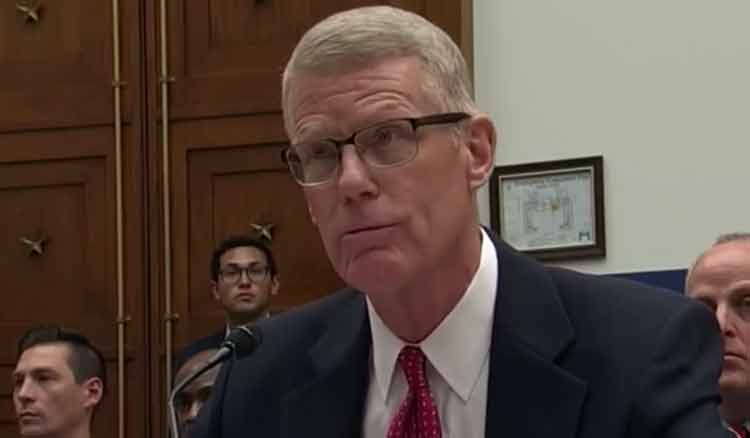
Department of Transportation Inspector General Calvin Scovel III at a hearing on FAA reauthorization in May. C-Span
The Department of Transportation’s Inspector General, Calvin Scovel III, last week delivered an 18-page letter to House Transportation leaders Rep. Bill Shuster (R-PA), Chairman of the Committee on Transportation and Infrastructure and Rep. Frank LoBiondo (R-NJ), Chairman Subcommittee on Aviation, following a six-month deep dive into the FAA’s business case and assumptions about NextGen.
After interviewing FAA and industry group representatives, the IG believes the FAA’s assumptions about the benefits NextGen will provide are overly optimistic. The agency projected NextGen will deliver about $161 billion in benefits by 2030, of which $2.7 billion has already been delivered to airspace users and the traveling public.
Scovel’s team skeptically concluded the, “FAA’s business case does not communicate the range of uncertainty or complex factors associated with NextGen implementation to Congress, aviation stakeholders, or the traveling public, which limits the Agency’s ability to set realistic expectations for realizing NextGen benefits.”
The IG said agency assumptions don't provide alternative outcomes or adjust for risks that may impact the actual delivery of benefits. The IG also questioned the value the FAA placed on the amount of passenger time saved when making its case for NextGen.
While the DOT agrees conceptually with the value of time to calculate benefits, some airline representatives were concerned the agency’s reporting of combined benefits (e.g., passenger time plus fuel savings, etc.) in one, broad category doesn’t deliver an accurate picture of the actual benefit to the airlines themselves. The IG said the airlines worry they might appear to be receiving more substantial benefits than they have actually to date.
Not surprisingly, The IG's letter could be interpreted by some as somewhat of a win for Shuster and LoBiondo who both support the efforts to sever the ATC system from the FAA. Yesterday's Politico Transportation newsletter however, detailed another read on the airline's complaints from Rep. Peter DeFazio (D-OR).
He accused the carriers of only complaining because passengers were seeing the direct benefits of NextGen so far, not the airlines themselves. "This report confirms that FAA's efforts to modernize our national airspace have delivered quantifiable benefits for all users," he said in a statement. Politico reported that after receiving the IG's report, an FAA spokesperson called the agency's math conservative because it didn't account for "all capabilities" it's expecting to yield benefits that haven't yet been quantified.
The FAA is continuing to work with industry to assess potential benefits from NextGen technologies and the steps required to realize them.

Subscribe to Our Newsletter
Get the latest FLYING stories delivered directly to your inbox






